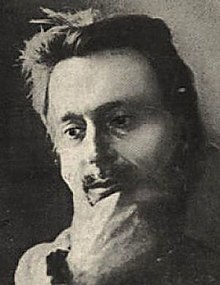Lev Chorny
Pavel Dmitrievich Turchaninov ( Russian Павел Дмитриевич Турчанинов ., Scientific transliteration Pavel Dmitrievič Turčaninov * probably in 1878 in Moscow ; † 27. September 1921 ibid), known by the pseudonym Lev Chorny ( Лев Чёрный ), was a Russian anarchist and poet. As head of the Black Guard , an anarchist workers' militia, he resisted the Bolsheviks in the so-called Third Russian Revolution .
Life
Lev Chorny was born in Moscow. His father was a colonel in the Imperial Russian Army . As a result of the Russian Revolution of 1905 , many anarchist groups emerged in the Russian Empire , which were particularly attractive to young people. Tschorny joined anarchist groups early on and later published books on the subject of anarchism. He was influenced by the individual anarchists Max Stirner and Benjamin Tucker and called for the total liberation of the personality from the shackles of society. He called for the Nietzschean revaluation of all values in Russian society and saw Peter Kropotkin's anarcho-communist ideas as a threat to individual freedom and rejected them. Because of his revolutionary activities he was exiled to Siberia by the tsarist regime .
After the outbreak of the February Revolution in 1917 , he returned to Moscow and became secretary of the newly established Moscow Federation of Anarchist Groups , which was founded in March of the same year. Although he was acquainted with Lev Kamenev and other leading Bolsheviks , at a rally on March 5, 1918, he strongly criticized the emerging Soviet Union and declared that the anarchists are as opponents of the socialist state as the previous bourgeois state. In the weekly Anarchija , he called for a decentralized method of production and the breaking up of internal power structures.
When the Bolsheviks began to systematically silence dissenters with repressive methods, armed groups, the so-called Black Guard , formed within the Moscow Federation of Anarchist Groups in the spring of 1918 , and Lev Chorny became the head of these newly formed workers' units. On the night of April 11, units of the Cheka stormed a building belonging to the Moscow Federation and encountered armed resistance from the Black Guard . In the ensuing struggle, 40 anarchists were killed or wounded and 500 were arrested.
Tschorny then joined the group of anarchists underground and published two papers in which he described the dictatorship of the Bolsheviks as the cruelest tyranny in human history. On September 25, 1919, underground anarchists bombed the headquarters of the Moscow Committee of the Communist Party of Russia, killing 12 communists and injuring 55, including Nikolai Bukharin . Although Lev Chorny was not involved in the crime, he was arrested and shot without trial in September 1921.
Individual evidence
literature
- Paul Avrich : The Russian Anarchists . Stirling 2006, ISBN 1904859488
Web links
- Article on jewniverse.ru (Russian)
- Prominent Anarchists and Left-Libertarians ( Memento from February 6, 1998 in the Internet Archive )
| personal data | |
|---|---|
| SURNAME | Tschorny, Lev |
| ALTERNATIVE NAMES | Turchaninov, Pavel Dmitrievich (real name); Турчанинов, Павел Дмитриевич (real name, Russian); Turčaninov, Pavel Dmitrievič (real name, scientific transliteration); Turchaninov, Pavel Dmitrievich (real name, English transliteration); Чёрный, Лев (pseudonym, Russian); Tscherni, Lew (pseudonym); Čërnyj, Lew (pseudonym); Cherny, Lew (pseudonym) |
| BRIEF DESCRIPTION | Russian anarchist |
| DATE OF BIRTH | uncertain: 1878 |
| PLACE OF BIRTH | Moscow |
| DATE OF DEATH | September 27, 1921 |
| Place of death | Moscow |
